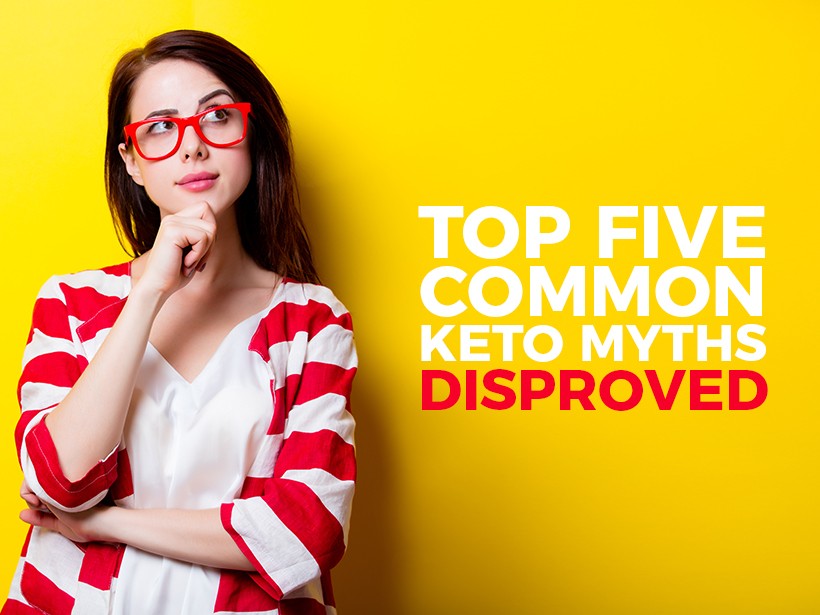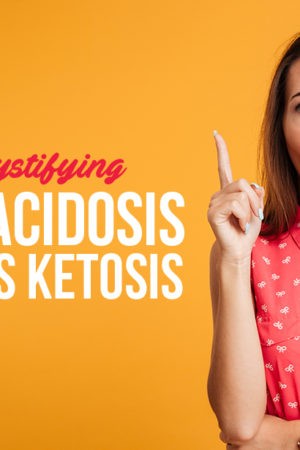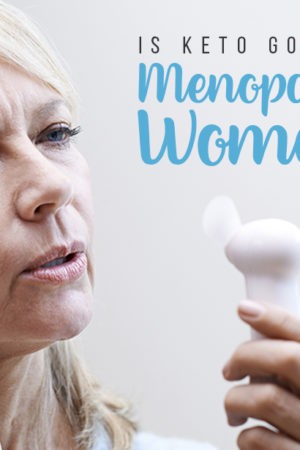The ketogenic diet is nothing new. It’s a low-carb diet that has been around for quite a while with countless studies to back it up. The research behind it and years of support strengthen the power of this diet. The whole idea is to lower your carbohydrate intake in order to burn fat and improve overall health. However, myths persist about the diet and can cause doubts in people who are considering trying it. Here are 5 of the biggest keto diet myths disproved.
#1: The ketogenic diet is something new.
The keto diet is based on fasting which was first performed by Parisian physicians in 1911 in order to treat 20 epileptic children and adults; the doctors found that the seizures after treatment were less severe than they were before. In 1921 researchers1 discovered that patients who consumed fewer carbs and more fat produce higher levels of beta-hydroxybutyric acid, a ketone body that fuels the body in the absence of glucose. Dr. Wilder of the Mayo Clinic took this information and proposed that this could actually be helpful for one’s health if ketosis was induced by other means. So, he suggested the ketogenic diet which was first tested in patients with epilepsy. Between 1941 and 1980, the keto diet was recorded in almost every textbook regarding epilepsy in children.
#2: Most weight loss is attributed to water weight.
Low carb diets do lead to the loss of water from the body. When glycogen stores deplete and insulin levels decrease, the kidneys shed both sodium and water. Consider a study2 of children between the ages of 1 and 14 years of age with epilepsy who were treated with the ketogenic diet. Among the symptoms of the ketogenic diet included weight loss and dehydration, thus supporting the notion of water loss on low-carb diets. But is the only weight loss water loss? No, in this 6-week long study of low-carb diets, participants lost almost 8 pounds of fat and gained 2.4 pounds of muscle.3
#3: The keto diet is bad for your heart.
Low-carb diets are generally high in cholesterol4 and fat. Cholesterol is a word that typically carries negative connotations, but not all cholesterols are bad. There are two types of cholesterol: high-density lipoproteins and low-density lipoproteins. On low carb diet, your high-density lipoproteins go up and triglycerides go down. As symptoms of this, blood pressure, insulin resistance, blood sugar and inflammation decrease. In other words, it’s actually good for your heart.
#4: Ketosis is dangerous like ketoacidosis.
Ketosis is a normal biological process which occurs when few carbs are consumed, insulin levels drop and fat is released from fat cells. The liver is then presented with a lot of fatty acids which it metabolizes to ketones. Ketones are molecules that can feed your brain and other important organs to supply them with energy. On the other hand, ketoacidosis normally occurs in Type 1 diabetics and occurs when the body can’t absorb sugars due to levels of insulin which are too low.
#5: Your brain needs carbs to work.
Your brain doesn’t need carbs to work; it actually functions more efficiently off of ketones! Your body still needs some glucose, but thanks to gluconeogenesis, you can produce all the glucose your body needs by the power of the liver which metabolizes protein and by-products of fat metabolism.
Hopefully, now you can rest easy knowing that the ketogenic diet has years of scientific support and experience behind it with these top 5 keto myths disproved!
NUTRITIONAL DISCLAIMER
The content on this website should not be taken as medical advice and you should ALWAYS consult with your doctor before starting any diet or exercise program. We provide nutritional data for our recipes as a courtesy to our readers. We use Total Keto Diet app software to calculate the nutrition and we remove fiber and sugar alcohols, like erythritol, from the total carbohydrate count to get to the net carb count, as they do not affect your blood glucose levels. You should independently calculate nutritional information on your own and not rely on our data. The website or content herein is not intended to cure, prevent, diagnose or treat any disease. This website shall not be liable for adverse reactions or any other outcome resulting from the use of recipes or recommendations on the Website or actions you take as a result. Any action you take is strictly at your own risk.
- Research Shows Improvement in Anorexia Nervosa Condition With Keto - August 6, 2018
- New Potential for Ketogenic Diet to Prevent Alcohol Withdrawal Syndrome - August 1, 2018
- Woman on Early Menopause Saved By Keto - July 25, 2018




